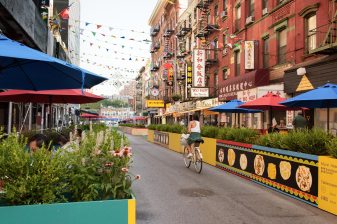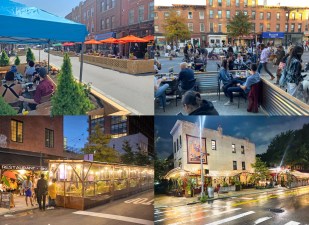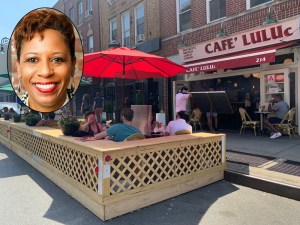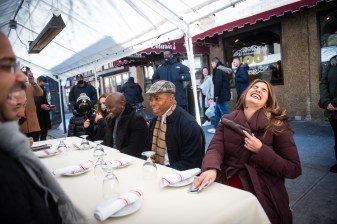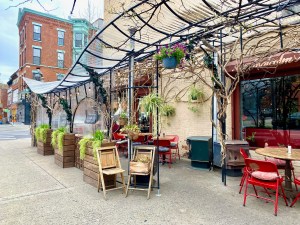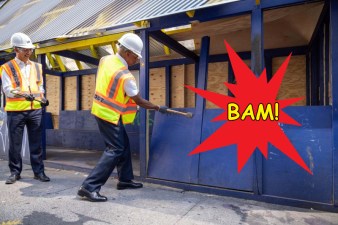Restaurateurs, Advocates Beg Council To Keep All-Year Outdoor Dining
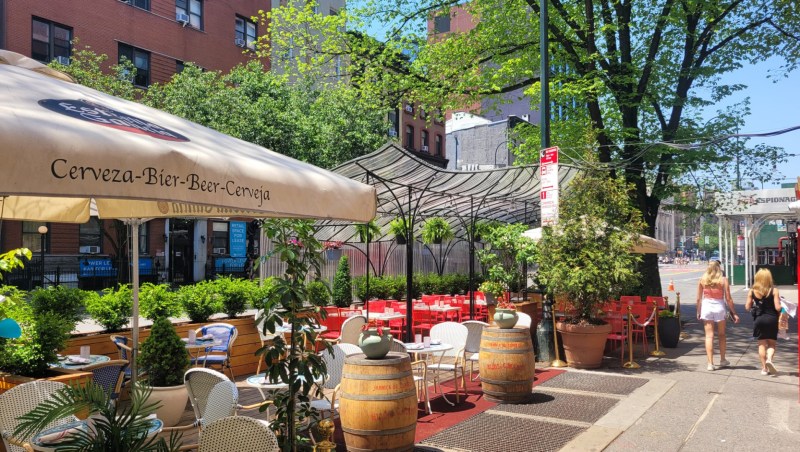
Restaurant owners and open space advocates called on city politicians to keep outdoor dining in the roadway year-round and pushed back on space-hungry car owners, after Streetsblog exclusively revealed that the Council plans to limit the pandemic-era “streeteries” to just the warmer months of the year.
Small business owners who invested tens of thousands of dollars in elaborate curbside eateries were incensed at the news that lawmakers want them to strike the structures at the onset of winter and rebuild them the next spring, saying it won’t be worth the cost or effort.
“If we have to take it down in the winter, there’s no putting that stuff back up,” said Donna Drakes, owner of the Caribbean restaurant Brooklyn Beso in Bedford-Stuyvesant. “I think that’s just a way for them to get rid of it.”

Council Speaker Adrienne Adams is expected in March to advance the long-stalled bill to make the pandemic-era open restaurants permanent.
The proposal will keep the initiative under the Department of Transportation that has run the popular Covid-era project, but outdoor dining in the roadway will only be allowed seasonally, while sidewalk cafés can remain all year, Council sources told Streetsblog.
Advocates with the pro-outdoor dining Alfresco NYC praised officials for finally making progress toward a permanent program nearly three years into the Covid-19 pandemic, but insisted the final law include a provision for roadside dining 12 months out of the year, rather than hand the space — largely for free — to car owners to store their cars.
“We don’t want the space for the public just three months a year, we want to see that space year-round and people deserve it and people want it,” said Felicia Park-Rogers, the director of regional infrastructure projects at Tri-State Transportation Campaign. “There were parking problems before and there will be parking problems in the future. That’s not a reason to take away these spaces and give them back to cars. … The pandemic is still happening and there are still people who can’t eat indoors.”
Kate Slevin, executive vice president of the Regional Plan Association, said if the seasonal provision goes forward, the city should consider a multi-year application so restaurants don’t have to fight for space from car owners every year.
“That could get the program into serious trouble if ever year you’re going back to the community and saying, ‘OK, now it’s time to move your car, now it’s time to allow the restaurant to have a dining shed on the street again,” Slevin said.
The city has not published specific design guidelines, and the Council has yet to update its original bill from a year ago sponsored by Council Member Marjorie Velázquez (D-Bronx). That bill would require restaurants to petition for separate licenses, with a sidewalk permit costing between $225–$510 every two years depending on the size, and $225 for roadway cafés.
City officials have in the past indicated that once enacted, outdoor dining will likely feature street furniture and barriers that are easier to disassemble than the current constructions, which have ranged from dilapidated shacks to highly-original buildings resembling a graffitied subway car or something straight out of a mid-century interior design catalogue.

Beso, a 12-year neighborhood staple, was able to expand its footprint with the colorful and plant-lined wood structure outside its Lewis Avenue storefront. Drakes said it cost $20,000 to erect, but has become a favorite among locals.
“They actually prefer sitting outside,” Drakes said. “They are happy to people watch while eating a great meal.”
The executive director of La Nacional, a 155-year-old Spanish restaurant on West 14th Street in Manhattan agreed, saying his area would lose an important community hub if the city forces him to give the curbside space back to private car storage.
“Parking again — is that the reason why?” asked Rob Sanfiz. “I can tell you that on 14th Street during the pandemic … we were the eyes on the block, we had given that block life.”

Restaurateurs also worried that they wouldn’t have the money or space to store outdoor dining materials during the off-season — especially if establishments across the city rush to find said storage space ahead of the same deadline.
“It will be a complete shit show,” said Charlotta Janssen, owner of French bistro Chez Oskar in Bedford-Stuyvesant. “It will make roadside pretty much unaffordable, because how can you store roadside dining, where can you store it.”
Still, open space experts were happy to see the Council leaders side with advocates and Mayor Adams to keep the program under the DOT, and hoped its moves to transition from what was essentially a three-year pilot program into a formal framework will open the door to reconsidering more street space for uses other than private vehicles.
“We recognize maybe it’s imperfect but we’re supportive of it because we’re supportive of the overall program,” said Matthew Clarke, executive director at the Design Trust for Public Space.
“What’s most important to us is to have a permanent program be under DOT and that we’re actually moving towards not only thinking of this as just a dining program, but really as a first step in thinking about the future of streets much more holistically, and I think that’s where the next step in the conversation will be.”
Speaker Adams did not respond a Streetsblog’s requests for comment to this story or Monday’s exclusive, but her press office circulated the following unnamed statement to other news outlets following Streetsblog’s coverage, insisting that discussions are still ongoing.
“Discussions with the Administration and stakeholders are ongoing, and no bill has been finalized yet. Reports to the contrary are premature. The Council is continuing to work on a bill that creates a permanent outdoor dining program for the city that strikes the right balance for our restaurants, neighborhoods, and all New Yorkers,” the statement read.
The statement does not explicitly question the accuracy of Streetsblog’s reporting, nor did the Council request a correction.
